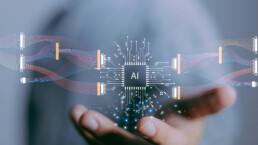Artificial intelligence (AI) is advancing at an unprecedented pace, transforming industries and redefining how we live and work. As we look ahead to 2025, AI is set to continue reshaping sectors like healthcare, finance, transportation, and education. While these innovations are exciting, they also bring challenges for professionals navigating rapid changes. This article explores anticipated AI trends for 2025, the challenges they pose, and how professionals can adapt.
Innovations Shaping AI in 2025
Enhanced Natural Language Processing (NLP)
In 2025, NLP is expected to achieve new levels of sophistication. Powered by large language models like OpenAI’s GPT-series, NLP technology is breaking communication barriers. From real-time translations to intelligent chatbots, these advancements make human-machine interaction seamless and intuitive. NLP-driven tools are already transforming customer service, content creation, and sentiment analysis. A report by MarketsandMarkets projects that the NLP market will grow from $18.9 billion in 2023 to $68.1 billion by 2028, signaling its growing importance across industries.
Autonomous Systems
Autonomous technologies, including self-driving vehicles and delivery drones, are poised for significant growth. These systems leverage computer vision and edge computing to improve efficiency and safety. For instance, autonomous trucks are already streamlining logistics operations, reducing fuel costs, and minimizing human error. According to a study by PwC, the autonomous vehicles market is projected to reach $400 billion by 2030, with major adoption expected in the next few years.
AI in Healthcare
Healthcare continues to be one of AI’s most impactful areas. Predictive diagnostics, robotic-assisted surgeries, and personalized treatment plans are revolutionizing patient care. AI-powered systems like IBM Watson are helping doctors analyze medical data faster, enabling quicker diagnoses and better outcomes. Additionally, according to McKinsey, AI has reduced drug discovery timelines by nearly 70%, saving billions of dollars.
Green AI
Sustainability is becoming a key focus in AI development. Innovations in Green AI aim to reduce energy consumption in large-scale machine learning models, aligning with environmental goals. Companies like Google are committing to renewable energy for AI operations, reflecting the industry’s dedication to combating climate change. According to the MIT Technology Review, advancements in algorithmic efficiency are expected to reduce the energy required to train AI models by 40% by 2025.

Professional Implications of AI Growth
Upskilling and Reskilling
As AI reshapes job roles, professionals must adapt by learning new skills. Roles like data analysts, machine learning engineers, and AI ethicists are in high demand. The World Economic Forum estimates that nearly 50% of employees will need reskilling by 2025 due to AI-driven changes. Platforms like Coursera and Udemy are already seeing a surge in courses on AI, programming, and data science.
Redefining Collaboration
AI is becoming an essential collaborative partner in the workplace. Intelligent tools handle routine tasks, freeing humans to focus on strategic decision-making. For instance, AI assistants like Microsoft’s Copilot streamline workflows by automating scheduling, research, and drafting tasks. This integration fosters greater innovation and efficiency.
Ethical Considerations
The proliferation of AI has brought ethical concerns to the forefront, including algorithmic bias, data privacy, and accountability. Companies must adopt ethical frameworks to ensure fairness and transparency. The AI Now Institute highlights the importance of diverse datasets and inclusive design to minimize bias and enhance trust in AI systems.

Challenges on the Horizon
Regulation and Governance
Governments and organizations face the challenge of crafting regulations that balance innovation with risk prevention. According to Stanford’s AI Index Report, 70% of policymakers believe current regulations are insufficient to address AI-related risks. Collaboration between the public and private sectors will be crucial in establishing effective governance frameworks.
Job Displacement
While AI creates new opportunities, it also displaces certain job roles. Automation has already impacted industries like manufacturing and administrative support. Mitigating these effects will require investments in retraining programs and social support systems. The International Labour Organization suggests that governments should allocate 1-2% of GDP to workforce transition initiatives.
Data Privacy and Security
AI’s reliance on vast datasets makes privacy and security critical concerns. Breaches of sensitive data can lead to loss of trust and financial losses. Companies must implement robust encryption methods and comply with regulations like the General Data Protection Regulation (GDPR) to protect user data.
Algorithmic Bias
Bias in AI algorithms can perpetuate inequalities, particularly in hiring, lending, and law enforcement. Addressing this requires diverse datasets and rigorous testing of AI models. The Harvard Business Review emphasizes that ethical AI starts with inclusive design and transparent decision-making.
Opportunities for Collaboration
To harness AI’s potential responsibly, collaboration among stakeholders is essential:
- Educational Institutions: Universities must integrate AI literacy into curricula to prepare students for AI-driven roles. Programs like those at Carnegie Mellon University set an example for other institutions.
- Businesses: Organizations must prioritize ethical AI development. Frameworks like Google’s AI Principles help align technology with societal values.
- Governments: Policymakers must engage industry leaders to craft balanced regulations. Collaborative platforms like the Partnership on AI foster dialogue on best practices.
These collaborative efforts are critical to ensuring AI benefits humanity while addressing its inherent risks.
AI in 2025 is a double-edged sword, holding immense promise while demanding careful navigation. By focusing on innovation, ethics, and collaboration, stakeholders can shape a future where AI benefits everyone.
Get in touch with us today to discover how we can help your investment message stand out and connect with the right audience.
Disclaimer: The information and content provided in Global One Media’s blog are for general informational purposes only and do not constitute financial, investment, trading, legal, tax, or any other form of advice or recommendation. The content is intended solely for distribution on Global One Media’s network and is based on information available at the time of writing. Readers are strongly encouraged to seek professional financial advice before making any investment decisions.

